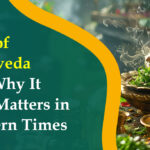In the era of high-end diagnostics and aggressive treatments in the field of oncology, there’s a certain tribe of people who are turning to a rather muted ancient science – Ayurveda. But not because it supplants conventional cancer treatments – rather, because it fosters something more fundamental: the body’s own intelligence to heal.
Pancreatic cancer is one of the deadliest forms of cancer, which has frustrated even the most sophisticated methods of allopathic medicine. But in Ayurveda, cancer is more than just a rogue growth of cells – it is an imbalance of energies, of doshas, a call to realign the body with nature’s rhythm.
Insight into Pancreatic Cancer in Ayurvedic Perspective
According to Ayurveda, the pancreas is not considered to be an individual structure. It is closely associated with Agni, the digestive fire, and the free flow of prana (life energy). Weak or vitiated Agni, due to poor lifestyle, chronic stress, and ama (toxic residue) can eventually result in disease in the organs like pancreas.
Pancreatic cancer is thought to directly result from prolonged aggravation of the doshas – especially Pitta, Kapha and Dhatu (body tissue system) imbalances. Modern medicine names it after the organ, but Ayurveda understands it as a complete-system failure. That step towards seeing things differently is critical. The body is not a war zone; it’s an ecosystem. And every inequity has a cause.
The First Step Is Not a Scan. It’s a Pulse.
Nadi Pariksha or pulse diagnosis is one of the most potent diagnostic tools in Ayurveda. Rather than receive lab reports, practitioners “listen” to the body’s rhythms through the wrist. This isn’t guesswork. It’s a quiet but profound way we can use to identify early imbalances – often long before symptoms show up.
As for pancreatic health, the pulse may reveal if there’s a sluggish metabolism, poor bile flow or a dampened fire in the digestive tract, early stages of distress that might never show up on a scan until it’s well advanced.
Here is where Ayurvedic treatment for pancreatic cancer starts – not with the disease, but with the patient in his or her entirety.
From Root to Remedy: A Reversal Journey
In Ayurved, there is no one herb or formulation to cure pancreatic cancer. It’s an integrated lifestyle transformation backed by centuries of empirical wisdom. The approach revolves around detoxification, rejuvenation, and mental-emotional alignment.
Panchakarma – Deep Detoxification
The foundation for all healing in India is panchakarma therapy. When customized for cancer recovery, particularly from a pancreatic disease, it serves to cleanse the liver, colon and lymphatic system – unclogging the pathways where toxins stagnate. This detox paves the way for real healing to begin.
This is not a spa treatment. It is an intense and private process that includes treatments such as Vamana (therapeutic emesis), Virechana (purgation), Basti (enema), and Nasya (nasal detoxification), directed by pulse readings and constitutional type.
For those who undergo the same pancreatic cancer panchakarma therapy, they often report feeling a sense of clarity, energy, and reset that chemotherapy can’t offer.
Herbal Wisdom: Nature’s Pharmacy
Herbs for pancreatic cancer in Ayurveda are strategically and gently targeted. Herbal formulations such as Guduchi (Tinospora cordifolia), Ashwagandha (Withania somnifera), Kanchanar Guggulu and Turmeric (Curcuma longa) have demonstrated adaptogenic and cytoprotective effects. But, when employed correctly they not only target malign masses – they bring back balance to digestion, immunity and emotional equilibrium.
This is important: Ayurveda doesn’t kill cancer; it makes the body so robust the terrain is no longer hospitable to disease.
Ayurvedic Medicine for Pancreatic Health
Maintenance of pancreatic function extends beyond tumor control. In this tradition, the emphasis is on re-igniting Agni, improving bile flow and fortification of the Srotas (channels). It is the person that receives the treatment and not the disease and in such circumstances, the selections of preparations like Avipattikar Churna, Punarnava Mandur, or liver-stimulating decoctions are done based on the constitution rather than disease label. There is a religious respect for personalization in this strategy.
Mental Clarity, Emotional Detox
Ayurveda doesn’t just encompass the physical. According to many ancient texts, long-term emotional repression and unresolved grief or chronic stress depletes one’s ojas (life sap) and disease penetrates. Practices such as Abhyanga (oil massage), Shirodhara and yoga nidra are included in management protocol for this.
And yes, meditation, pranayama, and sattvic diet somehow find a way into each day, not as an escape but as tools to rewire the inner world.
Modern Evidence Meets Ancient Intelligence
You don’t have to spur modern medicine to adopt Ayurveda. In reality, there is now research to validate certain Ayurvedic herbs and procedures as anti-inflammatory, immunomodulatory and anti-cancer. Many oncologists also encourage holistic cancer therapy or treatment methods for symptom control, quality of life and even improved prognosis.
Pancreatic cancer Ayurveda treatment is not a cure in the traditional sense – though it is also a testament to the fact that healing is not only about survival. It’s about living confidently, reclaimed, and restored to some semblance of meaning.
A Real Hope, Not a False Promise
No responsible Ayurvedic physician would make a claim for curing a case of pancreatic cancer. What they provide, however, is often deeper hope that doesn’t (overly) blind, care that doesn’t skip steps, and a strategy that nourishes life from inside out.
Conclusion: Where to Begin?
Centers that provide integrative protocols and Ayurvedic regimen to those who are looking at alternative and holistic ways to overcome cancer can be an excellent starting point for healing. One such location is HiiMS Premier, a Centre of Excellence in the multidimensional approach to the system of healthcare based on a password that combines Ayurveda, naturopathy, and modern diagnosis to help patients recover from chronic ailments and critical ailments. Utilising the principles of the DIP Diet and extended detox protocols, their methods provide a structured, evidence-based route to natural healing.
Because, sometimes, the answer is not to do more but to do what’s natural.













